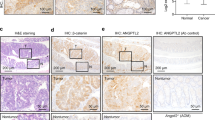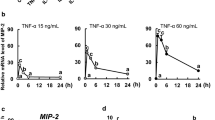Abstract
Objective
We investigated the effect of IL-1β on the development of intestinal epithelial stem cells.
Materials and methods
Normal intestinal epithelial cell line IEC-18 cells were cultured in the presence or absence of 200 pM of IL-1β in serum-free medium (SFM) for various time periods. The effects of IL-1β on intestinal stem cell self-renewal and IEC-18 cell proliferation were evaluated by a colony formation assay, MTT assay, and a focus formation assay. The expression of stemness genes including Bmi-1, Lgr-5, c-myc, Nanog, and β-catenin in IEC-18 cells were measured by quantitative PCR and western blot analysis.
Results
IEC-18 cells grew as a monolayer in SFM in the absence of IL-1β. Cellular spheres were formed when IEC-18 cells were grown in SFM in the presence of IL-1β. IL-1β induced the development of large colonies in the soft-agar as well as the formation of foci when IEC-18 cells were cultured in type-I collagen-coated plates. The expression of Bmi-1, Lgr-5, c-myc, Nanog, and β-catenin were significantly increased in IEC-18 cells treated with IL-1β.
Conclusion
Our studies provide direct evidence the IL-1β may play an important role in the self-renewal of intestinal epithelial stem cells and the development of cancer stem cells.



Similar content being viewed by others
References
Medema JP, Vermeulen L. Microenvironmental regulation of stem cells in intestinal homeostasis and cancer. Nature. 2011;474(7351):318–26.
Umar S. Intestinal stem cells. Curr Gastroenterol Rep. 2010;12(5):340–8.
Barker N, Clevers H. Tracking down the stem cells of the intestine: strategies to identify adult stem cells. Gastroenterology. 2007;133(6):1755–60.
Barker N, Ridgway RA, van Es JH, et al. Crypt stem cells as the cells-of-origin of intestinal cancer. Nature. 2009;457(7229):608–11.
Radtke F, Clevers H. Self-renewal and cancer of the gut: two sides of a coin. Science (New York, N.Y.). 2005;307(5717):1904–9.
Jiang H, Patel PH, Kohlmaier A, et al. Cytokine/Jak/Stat signaling mediates regeneration and homeostasis in the Drosophila midgut. Cell. 2009;137(7):1343–55.
Cronin SJ, Nehme NT, Limmer S, et al. Genome-wide RNAi screen identifies genes involved in intestinal pathogenic bacterial infection. Science (New York, N.Y). 2009;325(5938):340–3.
Amcheslavsky A, Jiang J, Ip YT. Tissue damage-induced intestinal stem cell division in Drosophila. Cell Stem Cell. 2009;4(1):49–61.
Buchon N, Broderick NA, Poidevin M, et al. Drosophila intestinal response to bacterial infection: activation of host defense and stem cell proliferation. Cell Host Microbe. 2009;5(2):200–11.
Apidianakis Y, Pitsouli C, Perrimon N, et al. Synergy between bacterial infection and genetic predisposition in intestinal dysplasia. Proc Nat Acad Sci USA. 2009;106(49):20883–8.
Bernstein CN, Blanchard JF, Kliewer E, et al. Cancer risk in patients with inflammatory bowel disease: a population-based study. Cancer. 2001;91(4):854–62.
El-Omar EM, Carrington M, Chow WH, et al. The role of interleukin-1 polymorphisms in the pathogenesis of gastric cancer. Nature. 2001;412(6842):99.
Cominelli F, Pizarro TT. Interleukin-1 and interleukin-1 receptor antagonist in inflammatory bowel disease. Aliment Pharmacol Ther. 1996;10(Suppl 2):49–53. (discussion 54).
Siegmund B. Interleukin-1beta converting enzyme (caspase-1) in intestinal inflammation. Biochem Pharmacol. 2002;64(1):1–8.
Hamilton MJ, Snapper SB, Blumberg RS. Update on biologic pathways in inflammatory bowel disease and their therapeutic relevance. J Gastroenterol. 2012;47(1):1–8.
Tu S, Bhagat G, Cui G, et al. Overexpression of interleukin-1beta induces gastric inflammation and cancer and mobilizes myeloid-derived suppressor cells in mice. Cancer Cell. 2008;14(5):408–19.
Miki C, Konishi N, Ojima E, et al. C-reactive protein as a prognostic variable that reflects uncontrolled up-regulation of the IL-1-IL-6 network system in colorectal carcinoma. Dig Dis Sci. 2004;49(6):970–6.
Shi J, Aono S, Lu W, et al. A novel role for defensins in intestinal homeostasis: regulation of IL-1beta secretion. J Immunol. 2007;179(2):1245–53.
Wang L, Liu Z, Balivada S et al. Interleukin-1beta and transforming growth factor-beat cooperate to induce neurosphere formation and increase tumorigenicity of adherent LN-229 glioma cells. Stem Cell Research and Therapy. 2012 (in press).
Quaroni A, Isselbacher KJ. Cytotoxic effects and metabolism of benzo[a]pyrene and 7,12-dimethylbenz[a]anthracene in duodenal and ileal epithelial cell cultures. J Natl Cancer Inst. 1981;67(6):1353–62.
Quaroni A, Isselbacher KJ, Ruoslahti E. Fibronectin synthesis by epithelial crypt cells of rat small intestine. Proc Nat Acad Sci USA. 1978;75(11):5548–52.
Ricci-Vitiani L, Lombardi DG, Pilozzi E, et al. Identification and expansion of human colon-cancer-initiating cells. Nature. 2007;445(7123):111–5.
Dontu G, Abdallah WM, Foley JM, et al. In vitro propagation and transcriptional profiling of human mammary stem/progenitor cells. Genes Dev. 2003;17(10):1253–70.
Dontu G, Wicha MS. Survival of mammary stem cells in suspension culture: implications for stem cell biology and neoplasia. J Mammary Gland Biol Neoplasia. 2005;10(1):75–86.
Tavakoli T, Xu X, Derby E, et al. Self-renewal and differentiation capabilities are variable between human embryonic stem cell lines I3, I6 and BG01 V. BMC Cell Biol. 2009;10:44.
Tian H, Biehs B, Warming S, et al. A reserve stem cell population in small intestine renders Lgr5-positive cells dispensable. Nature. 2011;478(7368):255–9.
Sangiorgi E, Capecchi MR. Bmi1 is expressed in vivo in intestinal stem cells. Nat Genet. 2008;40(7):915–20.
Bollrath J, Phesse TJ, von Burstin VA, et al. gp130-mediated Stat3 activation in enterocytes regulates cell survival and cell-cycle progression during colitis-associated tumorigenesis. Cancer Cell. 2009;15(2):91–102.
Grivennikov S, Karin E, Terzic J, et al. IL-6 and Stat3 are required for survival of intestinal epithelial cells and development of colitis-associated cancer. Cancer Cell. 2009;15(2):103–13.
Moon RT, Bowerman B, Boutros M, et al. The promise and perils of Wnt signaling through beta-catenin. Science. 2002;296(5573):1644–6.
Haegebarth A, Clevers H. Wnt signaling, lgr5, and stem cells in the intestine and skin. Am J Pathol. 2009;174(3):715–21.
Yu T, Chen X, Zhang W, et al. Regulation of the potential marker for intestinal cells, Bmi1, by beta-catenin and the zinc finger protein KLF4: implications for colon cancer. J Biol chem. 2012;287(6):3760–8.
Kaler P, Augenlicht L, Klampfer L. Macrophage-derived IL-1beta stimulates Wnt signaling and growth of colon cancer cells: a crosstalk interrupted by vitamin D3. Oncogene. 2009;28(44):3892–902.
Acknowledgments
We thank Ms. Xiaoxia Wang for her technical help. This research was supported in part by Innovative Research Award (L. Wang) from Johnson Center for Basic Cancer Research at Kansas State University, NIH R21 AI085416 (J. Shi), KBA-CBRI 611310 (J. Shi), NIH NCRR P20-RR017686 (PI: Daniel Marcus; J. Shi).
Author information
Authors and Affiliations
Corresponding author
Additional information
Responsible Editor: Liwu Li.
Rights and permissions
About this article
Cite this article
Wang, L., Liu, Z., Li, Y. et al. Pro-inflammatory cytokine interleukin-1β promotes the development of intestinal stem cells. Inflamm. Res. 61, 1085–1092 (2012). https://doi.org/10.1007/s00011-012-0501-3
Received:
Revised:
Accepted:
Published:
Issue Date:
DOI: https://doi.org/10.1007/s00011-012-0501-3




